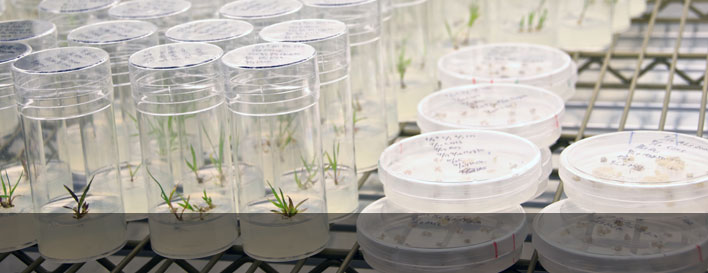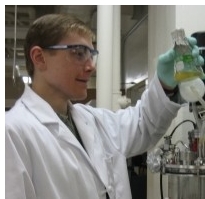Dr. Pete Heinzelman


Petroleum Replacements: Renewable Fuels and Chemicals from Solar-Derived Hydrogen
 Although new technologies, such as electric vehicles, could one day eliminate the need for petroleum-derived liquid ground transportation fuels, the feedstocks for polymers and surfactants from which items of our everyday experience, such as compact discs, saran wrap and laundry detergent, are manufactured will never be derived from a solar panel or wind turbine. Furthermore, it is unlikely that any aircraft will ever be capable of operating on electricity. As such, it is imperative that we develop routes for using energy, which will become increasingly abundant, particularly in the form of solar-derived hydrogen, to reduce carbon dioxide, the earth’s most abundant and accessible carbon source, to molecules that are useful polymer, chemical and aviation fuel feedstocks.
Although new technologies, such as electric vehicles, could one day eliminate the need for petroleum-derived liquid ground transportation fuels, the feedstocks for polymers and surfactants from which items of our everyday experience, such as compact discs, saran wrap and laundry detergent, are manufactured will never be derived from a solar panel or wind turbine. Furthermore, it is unlikely that any aircraft will ever be capable of operating on electricity. As such, it is imperative that we develop routes for using energy, which will become increasingly abundant, particularly in the form of solar-derived hydrogen, to reduce carbon dioxide, the earth’s most abundant and accessible carbon source, to molecules that are useful polymer, chemical and aviation fuel feedstocks.
Researchers in Dr. Heinzelman's lab are combining enzyme engineering approaches with strain optimization methods to create autotrophic microbes that utilize hydrogen to efficiently reduce carbon dioxide into molecules that can serve as feedstocks for the production of polymers, surfactants and aviation fuel.
Environmental Preservation: Engineering Algae for Rapid Carbon Dioxide Fixation in Open Ponds
Large scale open pond cultivation of biofuel-producing algae is a potential means of replacing petroleum as a source of fuel and chemical feedstocks and reducing atmospheric carbon dioxide levels. A major limitation to the deployment of open pond algal cultivations is the low diffusion rate of atmospheric carbon dioxide beneath the pond surface. As a result of this low diffusion rate, high rates of algal growth in open pond cultivations require feeding high-pressure carbon dioxide captured from industrial flue gases.The costs associated with capturing, pressurizing and transporting this flue gas carbon dioxide are high, open pond biofuel production would be much more viable if the algae were capable of achieving high growth rates on atmospheric carbon dioxide.
Dr. Heinzelman and his co-researchers are creating novel strains of algae that act as carbon dioxide mass transfer catalysts, eliminating or reducing the need for expensive flue gas carbon dioxide. They are also engineering algal strains that thrive under challenging growth conditions, such as extreme pH, where such phenotypes will reduce open pond cultivation susceptibility to invasion by unwanted organisms.
- Heinzelman, P., R. Komor, A. Kanaan, P. Romero, X. Yu, S. Mohler, C. Snow, and F. Arnold. "Efficient screening of fungal cellobiohydrolase class I enzymes for thermostabilizing sequence blocks by SCHEMA structure-guided recombination." Protein Engineering Design and Selection. (2010). 23.11: 871-80. Protein Engineering Design and Selection. doi: 10.1093/protein/gzq063.
Access the publication
- Heinzelman, P. "Efficient screening of cellulase genes for stabilizing blocks of sequence by structure-guided recombination." Paper Presented in American Institute of Chemical Engineers National Meeting, (November 7-12, 2010), Salt Lake City, Utah.
- Heinzelman, P., C. D. Snow, I. Wu, C. Nguyen, A. Villalobos, S. Govindarajan, J. Minshull, and F. H. Arnold. "A Family of thermostable fungal cellulases created by structure-guided recombination." Paper presented in American Institute of Chemical Engineers National Meeting, (November 7-15, 2009), Nashville, Tennessee. doi: 10.1073/pnas.0901417106.
Access the publication
- Heinzelman, P., C. D. Snow, M. A. Smith, X. Yu, A. Kannan, K. Boulware, A. Villalobos, S. Govindarajan, J. Minshull, and F. H. Arnold. "SCHEMA recombination of a fungal cellulase uncovers a single mutation that contributes markedly to stability." Journal of Biological Chemistry. (2009). 284.39: 26229-6233. Journal of Biological Chemistry. doi: 10.1074/jbc.C109.034058.
Access the publication
- Heinzelman, P. "Engineering cellulases for biofuel applications." Paper Presented in Symposium on Biotechnology for Fuels & Chemicals (May 12-16, 2009), San Francisco, California.
Engineering Cellulase Families for Biomass-to-Biofuel Conversion Processes by Pete Heinzelman
A presentation in the OK EPSCoR Biofuels Teleconference Series
Patents
- US Patent Application, (US10/27248), 2010. Stable, functional chimeric cellobiohydrolases.
- US Patent Application, (US10/30133), 2010. Polypeptides having cellulase activity.
- US Patent Application, (US11/38812), 2011. Stable, functional chimeric cellobiohydrolase class I enzymes.
